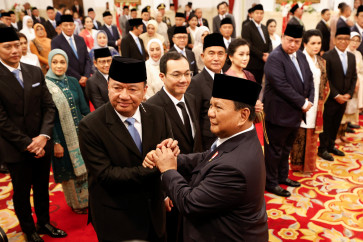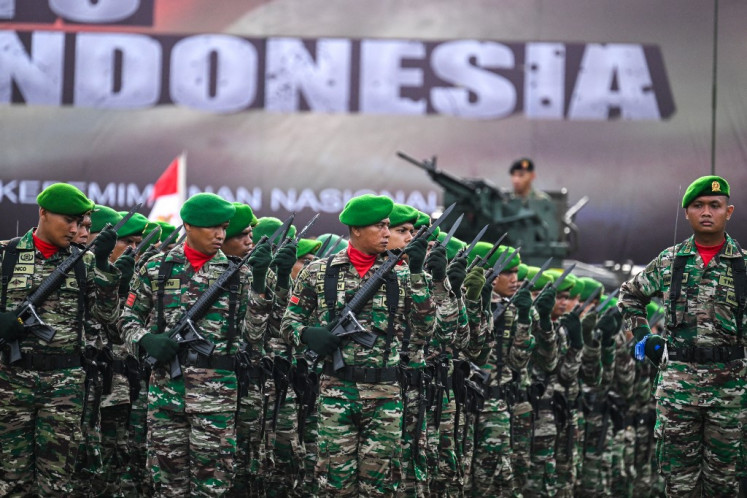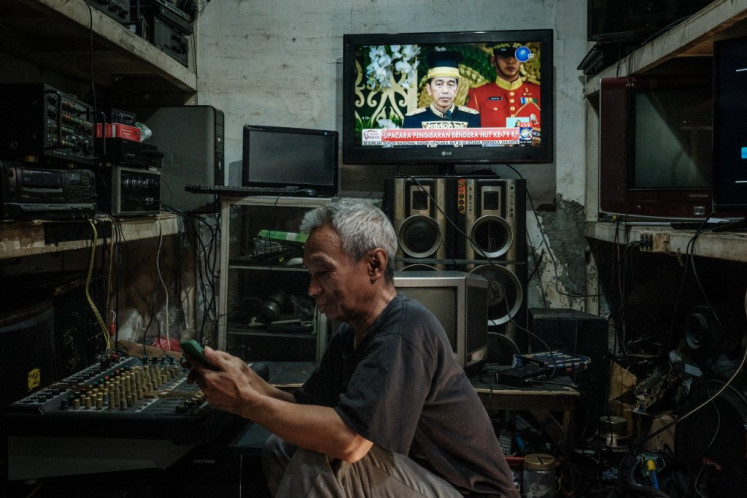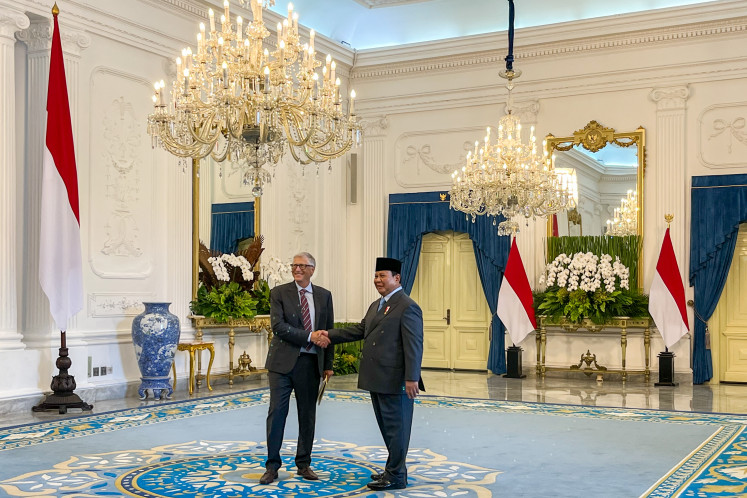Nahdlatul Ulama’s new leader marks era of ‘reorientation’
Yahya’s leadership signals return to principle of neutrality, expert says
Change text size
Gift Premium Articles
to Anyone

N
ahdlatul Ulama, the country's largest grassroots Muslim organization, has elected as its chairman an Islamic scholar hailed for having a reformist mindset, marking a potential “political reorientation” for the group.
Yahya Cholil Staquf was confirmed on Friday to have defeated two-term incumbent Said Aqil Siradj and three other candidates in a tightly contested race at NU's 34th muktamar (national congress) held in Lampung province.
Better known as Gus Yahya, he served in government as spokesperson to the late president and longtime NU leader Abdurrahman “Gus Dur” Wahid. He is also the brother of Religious Affairs Minister Yaqut Cholil Qoumas.
His triumph as NU’s new general chairman comes at a time of growing unease within the organization about its place in national politics, and amid growing conservatism and religious extremism among the nation’s Muslim majority.
Experts and scholars have said that both Yahya and Said come from the post-traditionalist school within NU and that there was not much in the way of ideological or political differences between them.
However, there is a growing number of younger NU students, activists and clerics who feel an affinity to Yahya’s reform-minded approach, said Ahmad Suaedy, an Islamic scholar and the dean of the Islam Nusantara faculty at the Indonesia Nahdlatul Ulama University.
“Yahya often expresses his reflections on the global situation and what NU can do to create change,” Ahmad told The Jakarta Post on Saturday.
“He also has the network to do so.”
‘Struggling together’
Yahya’s profile has grown in past years largely due to his wide global network, having cofounded the Bayt Ar-Rahmah Muslim group in California, the United States. He has also been involved in movements with other ulema groups to shape public perception on divisive issues such as political leadership and interfaith dialogue.
However, supporters believe the most compelling facet of his figure is his progressive views on the role that NU should play to advance and unite Islam.
In a speech delivered during a book launch event last year, Yahya contended that NU was not just another firqah (theological school of thought) within Islam that emerged to counter the rise of fundamentalist Wahhabism in Islam’s holy land, arguing that its role was instead to find “a change in civilization itself, to which no one knows its final form” and unite all Islamic sects in a “struggle together”.
“I reject the assumption that NU was founded as a response to the success of [fundamentalist] Wahhabis in mastering [Islam’s holy land]. It must be greater than that,” he told the audience at an event streamed live by TVNU.
“NU should not become rivals unto others. It is not in its place to do so. It’s not even appropriate for NU to compete with Muhammadiyah or the [Islam Defenders Front], [Hizbut Tahrir Indonesia] or even with the Wahhabis,” he said, speaking of various conservative Islamic groups.
Yahya’s approach stands in contrast to that of Said, who often takes a bold or even tough stance against what he perceives to be Islamist opponents.
“Said focuses more on pesantren [Islamic boarding school] traditions and the Middle East. His vast experience in Saudi Arabia dared him to strongly and openly criticize the Arab tradition that he was once a part of,” Ahmad said.
‘Reorientation’
The 34th muktamar raised questions over whether the organization of more than 90 million followers would further entrench itself in practical politics.
Incumbent Said has had a record of involving NU in the national political scene, having publicly voiced support for Gerindra Party chairman Prabowo Subianto, President Joko "Jokowi" Widodo's then-rival-turned-ally, during the 2014 presidential election.
He has also criticized the Job Creation Law, a key part of the Jokowi administration’s second-term agenda, as “oppressive” and suggested that it only benefited the wealthy.
In spite of this, Said was still able to develop a mutual understanding between NU and the government in a relationship largely underpinned by their shared concern over the rise of religious extremism and conservatism.
Since the muktamar in Jombang, East Java in 2015, Said has embarked on a campaign to promote Islam Nusantara (Islam of the Archipelago), framed as an antidote to the perceived increase in the country’s religious conservatism.
The NU campaign to articulate Islam Nusantara, both nationally and globally, received strong endorsement from Jokowi, who, as President, had increasingly come under fire from conservative groups and was widely considered by hardliners to have insufficient Islamic credentials.
Yahya, however, declared in a recent speech that he wishes to bring NU back to becoming a politically neutral entity, supposedly returning the organization to the principles of its 1926 founding charter. The charter forbids members from simultaneously holding executive positions in NU and political parties and prevents the group from directing its members to support a particular political party.
Wasisto Rahardjo, a political analyst at the Indonesian Institute of Sciences (LIPI), suggested that Yahya’s “political reorientation” of NU may be due to the fact that the organization had lost its mediating role when identity politics was on the rise during the last election.
“NU has somewhat become complacent and lost its dominance in the public sphere due to the rise of the 212 movement. As the largest Islamic organization, that’s like a slap in the face,” Wasisto told the Post.
The 212 movement is a quasi-political front born out of the anti-Basuki “Ahok” Tjahaja Purnama rally on Dec. 2, 2016, which had proven to be an effective vehicle to mobilize grassroots support, including in subsequent elections.
Wasisto said he believes Yahya, as the new NU chairman, would distance NU from the government, and orient itself toward becoming a stronger civil society organization.









